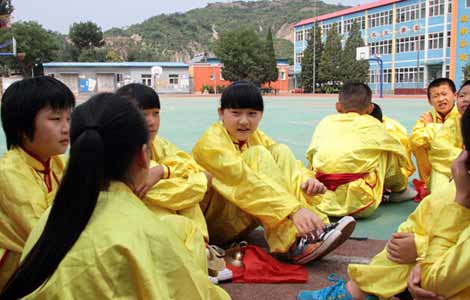Tibetan herders benefit from 'green' grassland
Updated: 2013-08-31 11:12
(Xinhua)
|
||||||||
LANZHOU - Many Tibetan herdsmen believe that the innumerable sheep and cattle crowding the range are blessings from Buddha, but many are now realizing that less is more.
One man, Kunsangyi, has found that restricting grazing actually makes him more money.
Kunsangyi tried to raise some 500 sheep ten years ago in Xiahe county of Northwest China's Gansu province, but after decades of overgrazing, the grasslands was unable to support so many animals.
Sheep nibbled at the tender shoots as soon as they appeared in spring: The animals went hungry, the grasslands shrunk, and desertifying sands encroached on the prairie.
"At that time, all my sheep were pretty skinny. Many froze to death in winter because we had no fodder," said the Tibetan herder, who is in his 50s.
Dead livestock were disposed of quickly with little or no returns, and emaciated animals had to be sold cheaply. "I made very little or even lost money," Kunsangyi recalled.
In 2003, Gannan Tibetan autonomous prefecture, which administers Xiahe county, started taking better care of the pasture. They banned grazing on barren grasslands, and restricted herds on land that needed to rest.
Maximum herd sizes were assigned to each piece of land. Herdsmen received subsidies if they abided by the bans and restrictions.
Kunsangyi received 2.18 yuan per mu (about $2.20 per acre) in compensation for in his 2000 mu (330 acres) of range, and built a barn with government funds to keep his sheep warm in winter.
To conform to the herd limit, Kunsangji reduced the number of his sheep to 300 head, and slowly the grassland began to revive.
"My sheep have enough food now, and they grow very fast and strong," he said.

 Li revenges on Robson to reach last 16
Li revenges on Robson to reach last 16
 Xi urges military to expand training
Xi urges military to expand training
 'Brother Watch' pleads guilty to corruption
'Brother Watch' pleads guilty to corruption
 Flight team performs first show abroad
Flight team performs first show abroad
 Theater to be built at Terracotta Warriors site
Theater to be built at Terracotta Warriors site
 Economic slowdown, railways hold back airlines
Economic slowdown, railways hold back airlines
 Sinopec takes stake in Egyptian oil
Sinopec takes stake in Egyptian oil
 Lost for words
Lost for words
Most Viewed
Editor's Picks

|

|

|

|

|

|
Today's Top News
5.9-magnitude quake jolts SW China
UK asked NY Times to destroy Snowden material
US boosts troops in Philippines amid tension
Xi urges military to expand training
US: 1,429 killed in chemical attack
IMF warns on capital account
Error costs Everbright millions
Economic slowdown, railways hold back airlines
US Weekly

|

|






